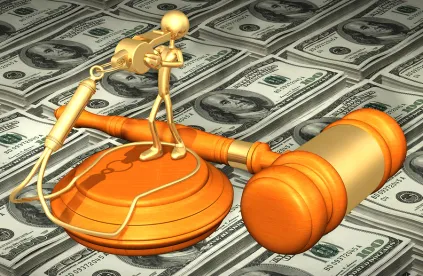In early March 2024 at the American Bar Association’s 39th National Institute on White Collar Crime, Deputy Attorney General (DAG) Lisa Monaco’s keynote remarks previewed the development of new and significant Department of Justice (DOJ or the Department) policy initiatives. Her speech reemphasized many of DOJ’s key themes throughout the current administration, including:
- individual accountability,
- the importance of strong corporate compliance programs,
- incentivizing voluntary self-disclosure of misconduct, and
- adapting to keep up with disruptive technologies such as artificial intelligence.
DAG Monaco’s remarks indicate that the Department will continue in 2024 to focus on to developing policies and guidance that further its goals related to corporate enforcement.
The Whistleblower Rewards Program
The most noteworthy update from DAG Monaco’s speech is DOJ’s development of a new whistleblower incentive and rewards program. DAG Monaco observed that whistleblower programs utilized by the Securities and Exchange Commission (SEC) and Commodity Futures Trading Commission (CFTC), among others, have successfully led to billions in disgorgement from corporate bad actors. However, these programs only cover misconduct within their agencies’ limited jurisdiction. In addition, qui tam False Claims Act cases are applicable only to fraud against the government. While these whistleblowing mechanisms have proven indispensable, DAG Monaco likened them to a “patchwork quilt” that fails to address the full range of corporate and financial misconduct that DOJ prosecutes.
Accordingly, DOJ intends to design and implement a Department-run whistleblower rewards program. Under the new program, when an individual helps DOJ discover significant corporate or financial misconduct not already known to DOJ, the individual may qualify to receive a portion of the resulting forfeiture.
DOJ will announce specific details about this initiative in the coming months, but DAG Monaco did highlight some basic tenets of the new program:
- payments will only be offered to whistleblowers after all victims have been properly compensated;
- payments will only be offered to those who submit truthful information that is not already known to the government;
- whistleblowers involved in the criminal activity reported on cannot receive an award; and
- payments will only be provided in cases where there is not an existing financial disclosure incentive, such as qui tam actions and other federal whistleblower programs.
In a subsequent speech, Acting Assistant Attorney General (AAAG) Nicole M. Argentieri provided additional context regarding the program. She stressed that the purpose is to fill gaps and repeated DOJ’s intention to offer awards only in areas where no financial incentives for disclosure already exist.[1] AAAG Argentieri noted that, like the SEC and CFTC whistleblower programs that limit rewards to cases resulting in sanctions of $1 million or more, DOJ expects to establish a monetary threshold for the program. She did not provide a contemplated threshold amount and stated that DOJ looks forward to receiving input on the topic.
While DOJ intends to accept information with respect to violations of any federal law, DAG Monaco reported that criminal abuses of the U.S. financial system, foreign corruption cases outside of the SEC’s jurisdiction, and domestic corruption cases are of particular interest to the Department.
The Connection to DOJ’s Voluntary Self-Disclosure Initiatives
The whistleblower rewards program is also intended to bolster DOJ’s 2023 policy efforts incentivizing voluntary self-disclosure of misconduct.[2] While DOJ’s recent policies seek to provide tangible benefits to companies willing to voluntarily self-disclose, many companies may view the risks of self-reporting as outweighing the potential reward.
However, the whistleblower rewards program adds additional layers of risk for companies to consider, each of which are intended to render voluntary self-disclosure a more attractive option. First, the availability of a monetary reward for whistleblowers will increase the likelihood that the government becomes aware of misconduct. In addition, the whistleblower rewards program may impact how quickly a company must mobilize to self-disclose, if it wants to preserve the benefits associated with doing so, and before any whistleblower. According to DAG Monaco, the competing incentives offered by DOJ (namely, a monetary award to the whistleblower and a declination for the company) are intended to “create a multiplier effect”—encouraging both companies and individuals to tell DOJ “what they know as soon as they know it.” In other words, companies may now have to race against their own employees to be first in DOJ’s door.[3]
While companies potentially vulnerable to False Claims Act liability have likely performed risk assessments in the past, the whistleblower rewards program is expected to have a material impact on self-disclosure considerations regarding potential violations of other statutes that yield significant settlement figures, such as the Foreign Corrupt Practices Act.
Whether or not the whistleblower rewards program will require employees to disclose potential misconduct within the company before reporting to the government will constitute a key aspect of the initiative. DAG Monaco repeatedly emphasized in her remarks the importance of adequately investing in corporate compliance programs. However, if whistleblowers are incentivized to disclose misconduct to DOJ before the corporation’s compliance function becomes aware of such misconduct, it may undercut the company’s ability to make the right choice for itself. A rewards-focused system may also create perverse incentives, where employees are motivated by monetary gain rather than genuinely furthering a culture of compliance.
Next Steps
DAG Monaco stated that a “90-day sprint” will take place to develop and implement a pilot of the DOJ-run whistleblower rewards program. AAAG Argentieri further explained the DOJ’s Money Laundering and Asset Recovery Section will play a leading role in designing the pilot program and will work closely with U.S. Attorneys, the Federal Bureau of Investigation, and other DOJ offices when considering eligibility requirements.
DAG Monaco also indicated that additional guidance may be developed with respect to voluntary self-disclosure. She remarked that at least two United States Attorneys’ Offices have piloted initiatives “that are, in essence, voluntary self-disclosure programs for individuals.” These initiatives offer incentives, such as non-prosecution agreements, to at-fault individuals who self-disclose wrongdoing and cooperate against more culpable targets. DAG Monaco explained the Department intends to evaluate the results of these pilot programs “and determin[e] what’s to come later this year.”
The specific standards adopted by DOJ in the coming months will prove critical. But one takeaway is already clear: DOJ is focused on incentivizing those with knowledge of corporate misconduct to come forward as swiftly as possible and report what they know.
[1] One highly anticipated topic is whether the whistleblower rewards program will provide more concrete guidance regarding its operation alongside qui tam actions. For example, while payments will not be provided under the whistleblower rewards program in cases where an alternative financial disclosure incentive already exists, if a whistleblower erroneously attempts to utilize the program, the resulting impact, if any, on a subsequent qui tam action remains unclear.
[2] Our more detailed analysis of DOJ’s policy efforts in 2023 to incentivize voluntary self-disclosure can be found here.
[3] For example, DOJ’s February 2023 Voluntary Self-Disclosure Policy for corporate criminal enforcement (the VSD Policy), which applies to all United States Attorneys’ Offices, sets forth timing requirements for disclosures. In order to qualify as a voluntary self-disclosure under the VSD Policy, the company’s disclosure must be made prior to an imminent threat of disclosure/government investigation, prior to the misconduct being publicly disclosed or otherwise known to the government, and “within a reasonably prompt time” after the company learns of the misconduct. Similarly, AAAG Argentieri noted that whistleblower rewards under the new program will be reserved for those who submit original, non-public, and truthful information not already known to the Department. In addition, whistleblower rewards are only appropriate in instances where the information is provided voluntarily and not in response to any government inquiry, preexisting reporting obligation, or imminent threat of disclosure.







 />i
/>i
